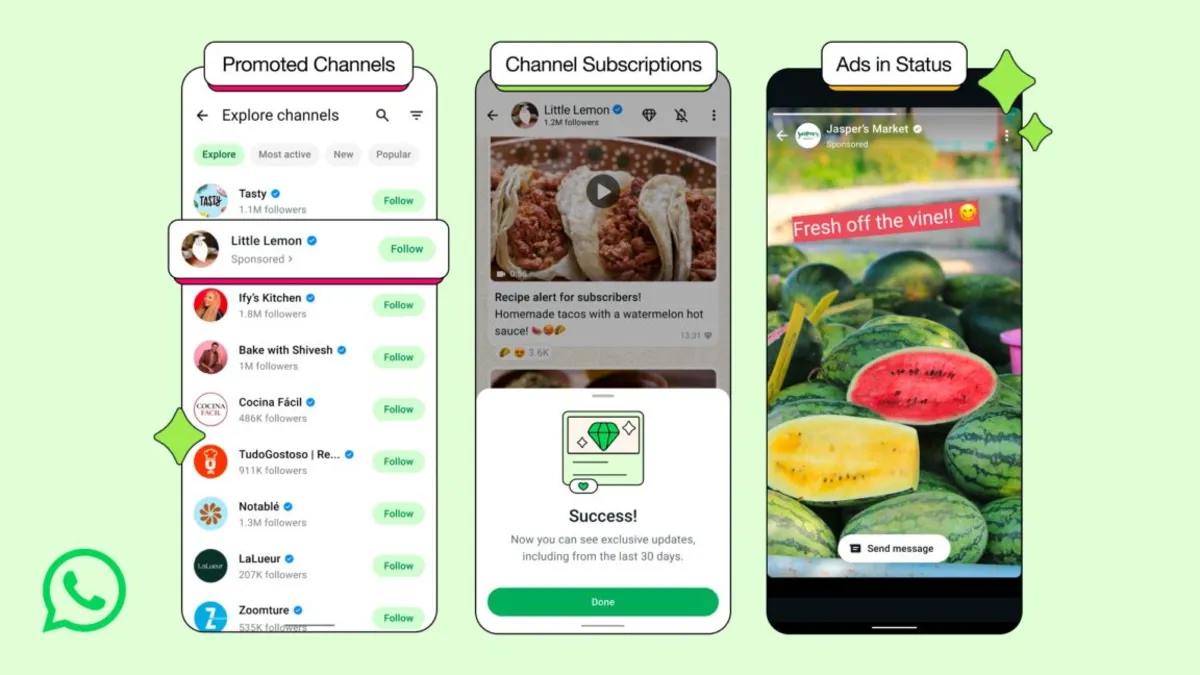
For the first time since its launch in 2009, WhatsApp is set to display advertisements within the app. This significant update is gradually rolling out, as announced by the parent company, Meta. Initially, these ads will only be visible in the Updates tab, a section where users can share their status, as well as access channels and groups that cater to specific interests.
Meta has clarified that the introduction of ads in the Updates tab is designed not to disrupt personal conversations. According to the company, approximately 1.5 billion users engage with the Updates tab daily. For those who primarily use WhatsApp for personal messaging, there's good news: it's possible to avoid seeing any ads altogether. “Now the Updates tab is going to help Channel admins, organizations, and businesses build and grow,” the announcement stated.
WhatsApp users can expect to encounter three distinct types of advertisements on the platform. The first type is displayed within the Status section, where users generally share ephemeral content such as photos, videos, and text that vanish after 24 hours. While browsing through friends' status updates, users may come across advertisements and have the option to message the company directly regarding the promoted offerings.
The second type of advertisement involves Promoted Channels. This allows channel administrators to enhance the visibility of their channels, offering businesses a new avenue to reach potential customers. Lastly, WhatsApp is introducing a subscription model through which advertisers can charge users a monthly fee for “exclusive updates.” For instance, users could subscribe to a cooking channel to receive alerts for new recipes.
To ensure that ads are relevant, Meta will utilize user data, including factors such as country code, age, device language settings, and general location (like city or country). Additionally, ad placements will be influenced by user engagement with the Status and Channels, such as the channels they follow, the content they interact with, and how they engage with the ads themselves. Importantly, the content shared in users' statuses remains end-to-end encrypted.
Furthermore, WhatsApp's ad placements may also consider how users interact with other apps within Meta’s portfolio. Users who engage with the Accounts Center can have their ad preferences synced across Meta’s services. This feature is optional, turned off by default, and can be removed whenever users choose.
While WhatsApp embarks on its advertising journey, the company emphasizes that user privacy remains a priority. An FAQ section on the ads explains that WhatsApp uses Meta’s technology to deliver ads while ensuring that personal information, like phone numbers, is either removed or altered before being shared. This means that Meta cannot identify users directly and only suggests ads based on broad characteristics, such as general area.
Moreover, WhatsApp assures users that personal information will not be utilized for ad targeting unless they opt for features that integrate with other Meta products. Users will also have transparency regarding ads, with options to see “why you’re seeing this ad,” control which advertisers can display ads, and the ability to hide or report ads.
Historically, WhatsApp has marketed itself as a privacy-focused messaging platform. However, the introduction of advertisements may challenge that image as the company strives to balance user needs with those of advertisers. Previously, WhatsApp generated revenue primarily through its paid WhatsApp Business Platform and by selling ads on Facebook and Instagram, which direct users to WhatsApp threads.
During a recent call with investors, Meta CEO Mark Zuckerberg indicated that the WhatsApp Business Platform has been a significant revenue driver but acknowledged the potential for increased revenue from ads on WhatsApp itself. With over 3 billion monthly active users and a growing user base in the United States, Zuckerberg emphasized that business messaging could become a crucial pillar for the company.
Alice Newton Rex, VP of product at WhatsApp, noted that the decision to introduce ads in the Updates section reflects a natural evolution, especially as businesses increasingly seek ways to connect with users directly through WhatsApp. Amid a challenging economic environment and fluctuating advertising market, many social media platforms are pivoting towards ads to enhance revenue streams.
With WhatsApp now joining the ranks of platforms like Reddit and Discord, which have successfully integrated advertisements, the move is seen as a strategic step for Meta. As WhatsApp continues to explore monetization options, this may be just the beginning of a new chapter in its advertising journey.